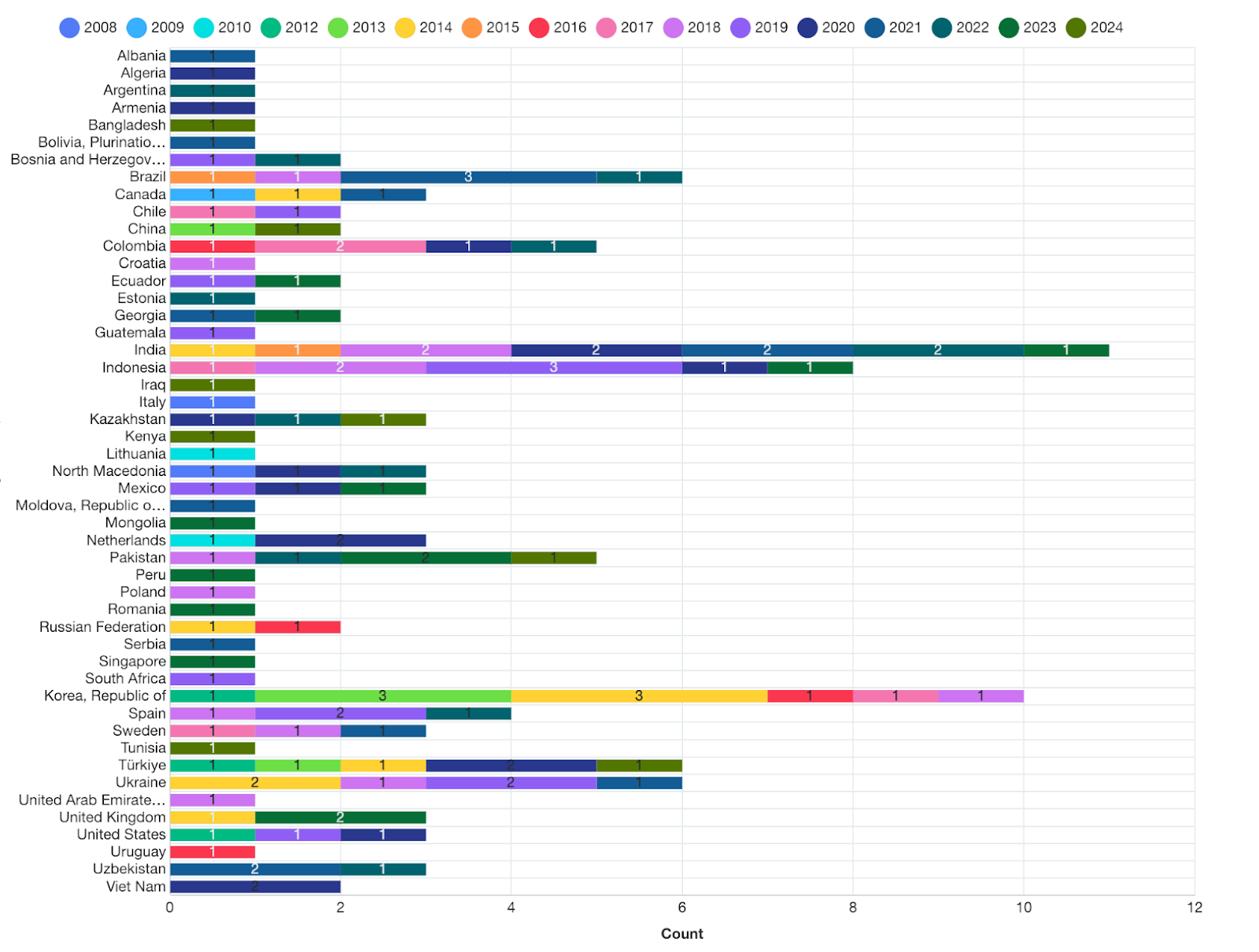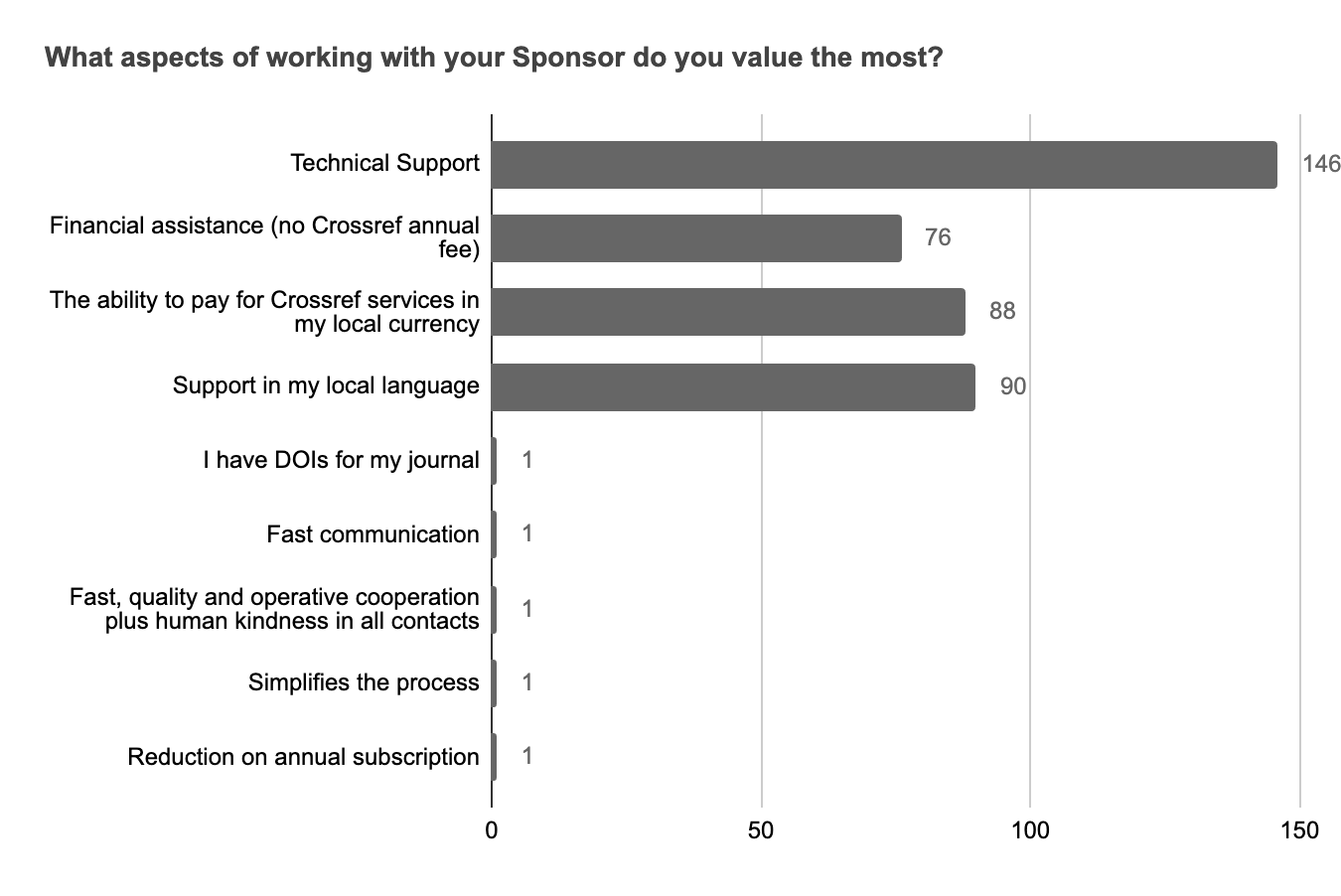8 minute read.Supporting Membership through the Sponsor Program
Sponsors make Crossref membership accessible to organisations that would otherwise face barriers to joining us. They also provide support to facilitate participation, which increases the amount and diversity of metadata in the global Research Nexus. This in turn improves discoverability and transparency of scholarship behind the works.
Our first sponsors joined in 2008, but the program started to grow rapidly between 2012-2014, with the addition of sponsors in South Korea, Türkiye, Russia, India, and Ukraine. In 2015, we welcomed our first South American sponsor from Brazil, followed by more sponsors in Latin America starting in 2016, and our first sponsor in Indonesia in 2017.
As of December 2024, Crossref works with 124 sponsoring organisations that support 12,195 sponsored members.
In 2021, we updated the criteria for organisations to be accepted as sponsors, raising the bar to ensure that potential sponsors accurately and successfully represent Crossref in the community. We also paused the acceptance of new Sponsors from regions where such organisations are already prolific. By doing so, we can focus on growing the program in areas with the greatest need.
In 2024, we added eight new sponsors to the program; these included our first sponsor in Bangladesh (our first GEM sponsor), as well as sponsors in China, Kazakhstan, Pakistan, Türkiye, Tunisia, Iraq, and Kenya.
Our five largest sponsors, based on the number of members they support (as of the end of 2024) are:
- Relawan Jurnal Indonesia, Indonesia - 3076 members
- Associacao Brasileira de Editores Cientificos do Brasil (ABEC Brasil) - 1312
- Tubitak Ulakbim DergiPark, Türkiye - 1248
- NEICON ISP, Russia- 713
- Kyobobook Center, South Korea - 419
The majority of sponsors are much smaller than this, looking after 25 or fewer Sponsored Members.
Each sponsor has specific criteria for what kind of organisations they work with. Some are dedicated to supporting organisations in a specific country or region, while others may be based on geography, language, subject area, or usage of a specific platform, e.g. OJS.
Our sponsors are distributed across all regions of the world, and we’re continuously working to forge networks with organisations in regions with the least coverage, to ensure scholarly communicators anywhere can join Crossref and contribute to the Research Nexus.
- Asia Pacific: 22
- Central and Eastern Europe: 29
- Central and South Asia: 25
- Latin America and the Caribbean: 24
- North Africa and the Middle East: 3
- Sub-Saharan Africa: 2
- US and Canada: 5
- Western Europe: 14
Currently, sponsored members represent 115 different countries, with the largest proportions from Latin America, South-eastern Asia, and Eastern Europe. Nearly two-thirds of sponsored members self-identify as universities, libraries, government agencies, foundations, scholar publishers, and research institutions.
To date, sponsored members have contributed 6.5 million works to the Research Nexus.
Importantly, the sponsored members have the ability to fully participate in Crossref – they are stewards of their records (even if some choose to delegate this activity to their sponsor), they can vote, stand in for elections to our Board of Directors, and collaborate with others in the Crossref community, just as any other member.
Sponsors are key partners for us in making participation easier for organisations in their communities. They work with us to provide administrative, billing, technical, and local language support to the members they work with. Depending on the financial model, they may charge members for their services.
Technical support they provide for members makes it more tailored and often quicker than the Crossref team could offer. For example, sponsors can provide service in their local language using their preferred method (helpdesk, WhatsApp, phone, email), which varies widely by region; or, where they charge any fees – they tend to collect those in the local currency. Some sponsors even take care of all the records registration for the members they support.
It’s important to note that sponsors can only support the participation of organisations that would otherwise be in the current $275 fee tier (or up to $500 for funders) if these organisations were to join independently. Regardless of the number of sponsored members, the sponsor pays one membership fee on behalf of them all, and then they also pay all the registration fees that are due on behalf of their sponsored members, which alleviates challenges related to paying in foreign currency. Overall, sponsors make Crossref membership more economical for the organisations that participate this way, and Crossref benefits from billing efficiencies.
In a recent survey of sponsored members (carried out in July 2023, with 204 responses from members working with 53 sponsors), the majority of sponsored members (88%) said that sponsors met their expectations and 85% are likely or very likely to recommend their sponsors to another organisation.
Respondents indicated that the aspects of working with a sponsor that were most valued are technical support (72%), financial assistance/no annual fee (37.3%), ability to pay in local currency (43%), and local language support (44%).
It’s important to note that sponsors often offer many non-Crossref services to members too, including anything from website design, copy editing, typesetting, set up of publishing platform, XML-JATS markup, to assistance with submitting content to third-party databases.
Sponsors represent Crossref in the community. They also assist us in connecting with their communities locally. In 2024, we collaborated with Biteca for an event in Bogotá, and Relawan Jurnal Indonesia for a two-day event in Jakarta. Both sponsors advised on venues, promoted the event to the members they support, coordinated local guest speakers, and provided translation services as needed. We also collaborated with Hipertexto-Netizen on engaging our community at the Guadalajara Book Fair. The success of these events was in part due to our collaboration with each sponsor.
Ensuring quality experience for our members
We try to make sure that every sponsor we work with will be able to commit to helping our members long-term. We offer training too, with an expectation that they can disseminate the learning to their members. The majority of sponsored members report receiving some training from their Sponsors (with 70% in our survey saying they’ve received adequate training on all services, while only 3% haven’t received any so far). Most recently we engaged sponsors with the Participation Reports to help them improve metadata completeness for their members.
In 2024, we’ve been meeting sponsors individually to review how things are going for them and their members – assessing member metadata quality, and additional services, as well as inviting their feedback about the program and suggestions for improvements that Crossref could make.
We’ve learnt a lot about practices related to record registration and training, business models and especially – a whole range of attitudes and approaches related to metadata completeness. Some sponsors register content for all or some of their members, while others provide technical support but do not register the content directly for members.
Members who used OJS often had higher scores because of the ease of use and availability of the plugins. Some sponsors noted that many journal editors are volunteers and don’t have the time or financial resources to collect extra metadata or update existing metadata records; they collect only what is required to register an item. Several sponsors also reported a barrier with authors’ mindset – they don’t tend to see the value of including ORCiDs or ROR IDs in their submissions. Somewhat surprisingly, we learned that not all members see the value in including references in their deposits or don’t wish to take the time to add them – this is a concern, as relationships created by references are a cornerstone of the Research Nexus, and markedly support discoverability of the content.
Sometimes, sponsors are unable to continue to provide services, or they are unable to meet the obligations of being a sponsor and their accounts are closed. In the cases where a sponsor account is closed, we will work with their members to find an alternative sponsor when possible.
Similarity Check is an external service provided in partnership with iThenticate, that’s available to Crossref members at a more competitive price, and it is in demand among the sponsored members too. Currently, 78 Sponsors offer Similarity Check to their members (however, not all sponsored members working with these sponsors have elected to use the service).
Sponsor LIBCOM Piotr Karwasinski was pleased that “All the rules of Crossref are unified. Everything is the same for everyone - the same for big publishers as well as small. Equal for everyone.”
Costs can sometimes be a concern; sponsors in India and Algeria both noted that $1USD is a lot of money for some. We mentioned the fee review being conducted with the RCFS project.
In summary
As we move toward realizing our vision of a connected Research Nexus, building a network for the global community must include input from all of the global community. When Crossref began 25 years ago our first members were mainly from the United States and Western Europe, but today our membership is much more global and diverse. Though our membership has grown to more than 22,000 organisations around the world, we are not seeing significant membership growth from all regions.
In the last few years, almost half of our members came from Southeastern Asia, Eastern Europe, and Latin America combined. However, there is much slower growth in other regions, mostly notably Northern and Sub-Saharan Africa, and parts of Central Asia, with only 5% of new member applications coming from these regions collectively. We know there are organisations in those areas contributing to the scholarly record, however, many continue to face financial, technical, and administrative barriers to become members.
The Sponsor Program is one of the avenues established to address and reduce barriers and to help facilitate membership and participation to all knowledge-sharing organisations worldwide. Ensuring it remains strong and successful requires collaboration, communication, and comprehensive training.






